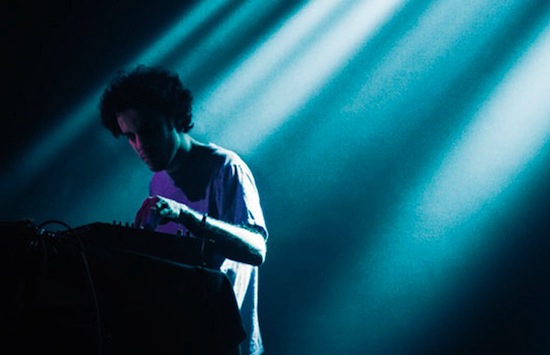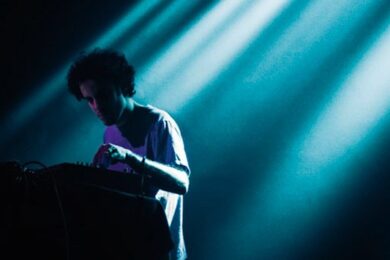Following Pink, his album collecting his dancefloor-honed recent 12"s, coming out this summer, Four Tet’s Kieran Hebden will be curating a sold-out night with Caribou at Brixton Academy on November 2. Fitting with the lack of ceremony surrounding Pink‘s release, the Brixton gig will be a frill-free occasion, focussing on nothing but the music, at a wallet-friendly £5 per ticket.
We caught up with him at his recent appearance at the Oxjam Festival in Dalston to talk about the industry, technology and why he won’t be looking to the Royal Variety Performance for any AV tips.
You played at Oxjam two years ago, what is it about Oxfam that makes you keep coming back?
Kieran Hebden: Well I support a number of charities, I think this Oxjam project is very accessible to me being involved in music and I had a great time when I did it a couple of years ago. It was a good musical experience, a good night out, a good night to support Oxfam, who are a very powerful and high quality charity that deserves a lot of love. If you’re going to deliver a message to a lot of people in an efficient way, music is definitely a nice way in to discuss bigger issues. I’m not scared to see music linked with charities or politics or world issues, I think all these things are linked. I think a lot of people think music is just entertainment and you shouldn’t take it any more seriously than that.
What do you think is wrong with the music industry at the moment?
KH: There is an enormous amount of music being released but I don’t understand why certain things pick up and others don’t. I feel there isn’t any particularly great kind of music media around; magazines are all really suffering and no one is getting paid. If you were a kid nowadays you wouldn’t be dreaming of being a music journalist. I think the thing that irritates me the most though is the way the major record labels still dominate the scene. For a moment everyone thought “oh, piracy is going to change things” but their response was to dig their heels even harder and dominate the market even more. They are controlling things in a very full-on way. I grew up in the nineties where there was a very strong D.I.Y. aesthetic and I really want to see that kind of behaviour encouraged more and more.
Musicians need to be more independent, essentially.
KH: Yeah, people doing things for themselves and being like “fuck, Spotify”. I mean, I didn’t want to put my new record on Spotify at all but every other record is already on there and I didn’t want people to go on there and not be able to listen to the new stuff. So I already feel like I’m trapped into these type of things. There are so many new artists who come along, but their agenda is never “fuck iTunes”, usually their agenda is “maybe we can get on the iTunes front page, I love Apple!”
I see a big trend to try and make everything that much more glitzy, expensive and exclusive. Tickets for gigs are getting more expensive, it’s all about having a lavish light show, two or three levels of V.I.P sections. You go to Ibiza now and there are rich Russian businessmen on yachts coming along. It’s following the same kind of path hip hop has gone and if people want to do that, whatever, but I want to see some alternatives as well, like I’m doing this event at Brixton Academy in a few weeks, where we’ve made the tickets £5.
That sounds great – how come?
KH: I did it because I saw Fugazi there when I was a teenager and it cost £5 pounds to get in and it was an amazing night that really resonated with me. But people in electronic music put on a night at Brixton with the whole thought of “let’s have 4,000 lasers, go-go dancers and let’s make it this full on multimedia shabang” and I’m like it doesn’t always have to be like that, why don’t we do something that is £5 to get in, that’s very inclusive and welcomes everyone to a have a different sort of musical experience. There’s going to be no lighting in the event and it’s not going to be about performance on stage. I think with having a cheap ticket, people are going to come along not expecting some kind of extravagant show. For me, these days I see certain things that are becoming entertainment rather than music, in a kind of Royal Variety Performance-type of direction. If I see a clip of, I don’t know, Madonna on TV, it’s no different to a Lloyd Webber production, it’s just a choreographed show.
It almost sounds like you’re opposed to using any audio visual installations in your own shows?
KH: I’m not opposed to it; I’m just not very interested in it at the moment. If you got one of those things going on as a special thing, that can feel quite amazing. But when you go to festivals and there are eight performers and they all have their big multimedia event going on, then it’s a bit like you feel that you’re some kind of multimedia artist rather than a musician. I mean, are you going there to listen to the music or are you going to look at visual art, and if you’re there to see the combination of the two, are they distracting of each other?
The way musicians are making music is changing too; I know Jamie XX is currently engineering a new instrument based on both an MPC sequencer and an iPad. Do you know developments you know that are coming along?
KH: Yeah, I have heard a lot about the touch screen stuff so I can see that being used soon. Everybody is thinking hard to do new and wonderful things. But in the past the main innovations in music came from the abuse of it. Like Jimi Hendrix’s use of the whammy bar combined with feedback to created those screeching howls, the same way as when people that took samples that were supposed to recreate symphonic sounds or whatever, sampled James Browns drums instead and made hip hop beats. The moment I really look forward to is somebody taking a piece of technology and using it for something it was never ever intended for, because it’s those kinds of bold moves that change music.
What kind of cities do you think are producing some exciting electronica at the moment?
KH: I have been living in New York for the last year and all it did was remind me how wicked London is. The music scene here is on another level. It’s to do with the geography of it more than anything. We’re between America and the rest of Europe, getting the best from both worlds. There is some great stuff happening in Berlin, but the best of it is coming to London.
It’s almost become the capital of electronic music.
KH: Yeah, but then I went to Senegal, you go there and the music going on there will remind you that we don’t know about everything in London, because you will go to a restaurant there and see the best musician you have seen all year play there. You know what’s going on there is a very specific thing and if any of those guys came to London, people would freak out. At the moment, though, in terms of music, London has definitely got a good thing going on.



